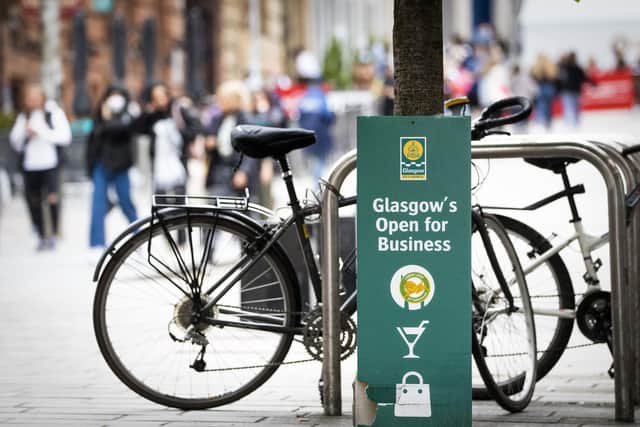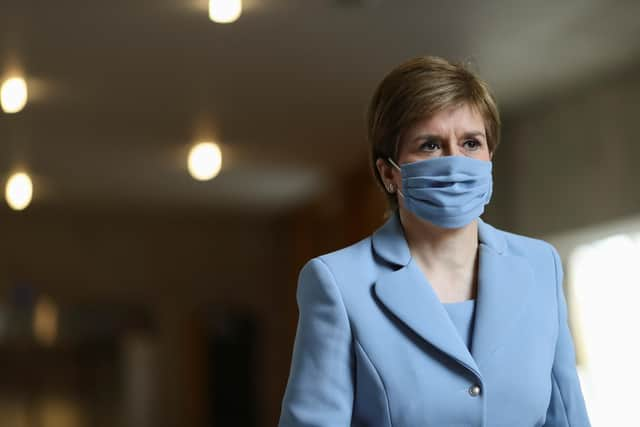Health experts say moving parts of Scotland to higher lockdown levels would be ‘difficult’ – even if cases rise
This article contains affiliate links. We may earn a small commission on items purchased through this article, but that does not affect our editorial judgement.
Moving parts of Scotland in Level 2 of coronavirus restrictions with high case rates to higher levels would be “difficult”, a public health expert has said.
Linda Bauld, professor of public health at the University of Edinburgh, spoke about the reasons behind Glasgow being the sole council area in Scotland remaining in Level 3 of the Scottish Government’s five-tier restriction system.
Advertisement
Hide AdAdvertisement
Hide AdWe want to hear from you: let us know what you think about this story and be part of the debate in our comments section below


First Minister Nicola Sturgeon announced on Friday (28 May) the local authority would remain at the higher level for at least another week due to an “uncomfortably high” level of cases amid an outbreak driven by the Indian variant of the virus.
She said a decision would be made by Wednesday at the latest on whether the city can move to Level 2 next Saturday (5 June).
People in the city are not able to meet other households indoors in their homes and there are stricter restrictions on hospitality, including a ban on selling alcohol indoors.
Non-essential travel in and out of the city is prohibited.


What did Linda Bauld say?
Speaking on BBC Radio Scotland’s Good Morning Scotland programme, Bauld said the Scottish Government has “stalled” Glasgow in Level 3 due to concern about whether rising cases are leading to more people in hospital.
“They are just hanging on a little bit longer to make sure they can be confident that cases are not translating to more people in hospital,” she said. “In contrast, there are worrying signs in parts of Edinburgh – Silverknowes and Davidson’s Mains.
“In Renfrewshire and Midlothian there are high cases but because they are already in Level 2 to then reverse that, policy-wise, would be more difficult.”
Speaking on the same programme, Stephen Reicher from the University of St Andrews and a member of the Sage sub-committee advising on behavioural science, said caution is the correct approach over the Glasgow outbreak.
Advertisement
Hide AdAdvertisement
Hide AdHe said: “We’ll find out within a week or two exactly how serious it is. If it’s very bad, we’ll learn in a week or so. If it’s bad, we’ll learn in a couple of weeks.
“I think it’s worth pausing for a moment or two rather than to have to face the possibility of going back to the really dark days of January and February.”
He added: “Hospitalisations are going up at moment, we’re not yet seeing increases in people at intensive care units and thankfully we’re not seeing deaths yet.
“The real danger is if you wait until you’re certain then the difficulty is it might be too late, you might have reseeded this variant and we might then inevitably in two or three weeks’ time see the terrible statistics in ICUs and deaths going up.”
What’s the situation in Glasgow?
Scotland’s Health Secretary Humza Yousaf said there was “significant community transmission” of coronavirus in the Glasgow hotspots.
The city will remain under Level 3 of Scotland’s restrictions until at least 5 June, and Yousaf said urgent work was being carried out to understand the outbreak in south Glasgow and how the Indian variant arrived.
He told BBC Radio 4’s Today: “In a few concentrated hotspots… we are seeing significant community transmission. The levels and the numbers of cases are continuing to rise.”
In other parts of the country “local health teams tell us they are relatively contained outbreaks” linked to either schools or domestic clusters, but that was not the case in Glasgow.
Advertisement
Hide AdAdvertisement
Hide Ad“What we are seeing is it’s coming in in areas where there is a large, diverse community so therefore there is a probability the variant has come in from international travel. Therefore we are trying to get to the bottom of how it managed to get in.”
Meanwhile, the First Minister has told people in Glasgow not to eat and drink in pubs or restaurants outside the city even if they are allowed to travel to other parts of the country.
The First Minister said residents should still follow the Level 3 restrictions on hospitality even when making permitted visits out of the city, after Scottish Greens co-leader and Glasgow resident Patrick Harvie was caught drinking in an Edinburgh bar with colleagues.
Asked about the apparent breach of coronavirus rules, Ms Sturgeon said: “I live in Glasgow, I come to Edinburgh for work, but I, you know, take the view that the hospitality rules that apply to me are the ones that apply in Glasgow because that’s where I live."
Speaking at the Scottish Government’s coronavirus briefing, Sturgeon said: “I would say to anybody in Glasgow: if you’re having to travel for work that’s fine, but apply the hospitality rules that apply in Glasgow.
“Because that reduces the risk of us in Glasgow, where there’s higher transmission, taking it – if we have it in do know we have it – into a pub bar or a restaurant.”
A message from the editor:
Thank you for reading. NationalWorld is a new national news brand, produced by a team of journalists, editors, video producers and designers who live and work across the UK. Find out more about who’s who in the team, and our editorial values. We want to start a community among our readers, so please follow us on Facebook, Twitter and Instagram, and keep the conversation going.
Comments
Want to join the conversation? Please or to comment on this article.
